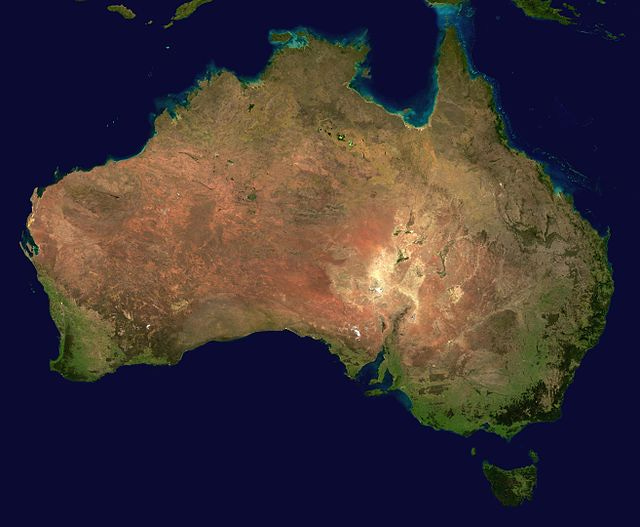Notanda et Miranda
Plans for Australia (deo volente), Bureaucracy with an Australian Accent, Ohtani (again), and the Sequel to Castle MacGorilla
1. I am supposed to be in Australia for most of August—from the ninth to the twenty-eighth, to be precise—giving some lectures, participating in some panels, sitting for some interviews, attending the opera in Sydney, exploring certain aspects of indigenous affairs, saturating my body’s cells with splendid coffee, watching the Orioles on a tablet during breakfast, exploring the Blue Mountains, and trying to forge meaningful connections in the kangaroo and wallaby communities. My son Patrick will be accompanying me, and we intend to take in as much as we can during our free hours (of which he will have far more than I shall). While there, however, I will not prove recreant to my duties at Leaves in the Wind. I shall be posting “Dispatches from the Antipodes” during the weeks I am away. At least, those are my plans for what I shall do if everything goes as it should. —If...as the Spartans said to Philip of Macedon.
2. That if is something of a source of anxiety just at the moment. I am at present in a state of limbo as regards my “Electronic Travel Authorization” (the visa that all visitors to Australia are obliged to apply and—more important—pay for in order to be allowed to enter the country). Everything should be all right, but a data-entry error on the part of someone at the Department of Home Affairs, combined with the staggeringly stupid system used for granting ETAs, has added an unpleasant element of suspense to the whole affair that I could have done without. For reasons known only to the good, simple, whisky-soaked souls who created it, the ETA process may not be immune to clerical errors, but it is rigidly designed to assure that such errors, once made, are absolutely incorrigible. I would seem also that the office of inquiries that deals with such matters exists solely for the purpose of refusing to take the least responsibility for the department’s mistakes or to provide any assistance to those inconvenienced by them. As far as I can tell, in fact, its staff is trained chiefly in peevishly complaining about travelers so unreasonable as to expect them to do anything about anything. The supervisor I spoke to on my third and final phone-call to the office—I have the oddest impression that he told me his name was Sabrina, but I would not swear to that—finally agreed to send an email to someone at the Home Affairs Department but left me with the advice that I should simply show up at the airport on the day and see what happens. Then he returned to the cigarette-break I had so rudely interrupted with my call (I imagine it usually runs about eight hours). But I am not telling the tale very well.
3. The only means for acquiring an ETA, by the way, is an Australian Government app that can read one’s passport and then file one’s application electronically. What the poor Luddite or elderly recusant from late modernity who eschews smart phones is supposed to do in order to get into the country I cannot guess. I have to say, I find it very odd when individual nations, in their eagerness to be in the vanguard of technological advancement, choose to modernize entirely out of step with most of the rest of the world. My eldest brother lives in Norway, for instance, where written checks are no longer a recognized form of payment; as a result, when my sister-in-law, the iconographer Solrunn Nes, sells her work to foreign collectors, she cannot accept the checks that some of them understandably want to send her. It would be hard to say how exactly this benefits anyone; certainly there is nothing especially onerous about processing checks, since these days they are in fact coded documents that can be read by the same systems that banks use for all other transfers of funds. But—well, back to my story.
4. My son and I each used the Australian government app to record his passport information, allowing it to read the machine code and the e-chip in each. The app then filed our application and, within minutes, each of us received a pdf document by email confirming that his application had been accepted and the ETA had been granted. All seemed well at that point. Later, though, when my son had checked his app and confirmed that his passport had been properly linked to a visa, I discovered that my app claimed that I had no visa at all. What followed was rather on the order of a cyberspace seance. I mean, I can call the spirits from the vasty deep, and so can you, or so can any man; but will they come when you do call for them? After three inquiries by way of the “contact us” box on the app, a thin and spectral voice from the virtual beyond at last seemed to reach me, attended by a wisp of pixelated ectoplasm. I was sent a link to check my “VEVO” (which stands for something, but I do not care enough to remember what). This is the official record of one’s passport and visa status. There I found that someone had entered my middle name incorrectly. One would think this a problem easily fixed. And yet not so (that comes from Richard II, in case you missed the earlier reference to Henry IV part one). Subsequent sessions of scrying and table-knocking finally elicited another response, informing me that, once data has been recorded on a VEVO, it is entirely unalterable; if it contains errors, alas, they are now eternally indelible; God himself would be powerless to change a word. As for whether I would be able to travel to Australia on the appointed day—well, that no one could say, and certainly it was incumbent on no one at that end to find out for me. I then tracked down the telephone number of that aforementioned inquiries office; it was well-concealed, I must say, but at last I found it (here too a few mystic incantations were required, as well as an offering of three drops of my blood). I spoke to three different representatives over the course of four hours, spread over two days. At the end of the first day, I was convinced by one representative that the thing to do was to reapply, which I did. Again, a pdf arrived telling me I had been granted an ETA; again, the app failed to register any visa status for my passport; and now I could not check the VEVO for my second application at all because, as I was informed the next day, once a VEVO has been recorded not only is it unalterable; it cannot be replaced by a subsequent VEVO. All of the representatives tried to convince me that the trouble lay not with their system but with my passport, which must obviously have recorded my name incorrectly. To each of them I had to explain that this is not possible, that it is visibly not the case, that I have traveled far and wide on that document, that the US is not noted for its leniency or latitude on such matters, that a US passport is something like the gold standard of the genre, that the ETA app preserves a record of the information it reaps from one’s passport, and that all of the information that appears there on my copy of the app is correct. Even after I succeeded in convincing each of them that the problem had arisen at their end, each assured me that there was absolutely nothing that could be done about it, and each became indignant at the suggestion that someone in the Department of Home Affairs must possess the power and the discretion to correct what is, after all, only a data-entry failure. There is, I protested, no such thing as an ineffaceable computer record. All of this culminated in my extended Auseinandersetzung with that torpid tortoise of a man whom I still seem to think was named Sabrina. Seven times, Sabrina—I’m sticking with that name—put me on hold, obviously for no reason other than the hope that I would give up and ring off, and then seemed annoyed on discovering that I was still there when he returned. When I at last convinced him that he would not be rid of me until he at least appeared to be doing something, he agreed to write that email I mentioned. Nothing as yet has come of that, however. In the meantime, my principal host in Australia has made what inquiries he could under the law and came away with the assurance that everything should be all right on the day of travel, so long as I come armed with the printed record of my ETA acceptance...and perhaps get to the airport early, in case of complications. So we shall see.
5. I suppose this is actually a rather boring story. Sorry. I will say this, though: I have dealt with bureaucratic delays and convolutions and derelictions in the past, in a variety of countries—and even Greece came off better than this—but chiefly in the US. Despite my somewhat jaundiced view of all such agencies, especially in the States, I have to say that I have never before encountered a government inquiries office whose response to a request for assistance with an error committed at their end would be a refusal to take any responsibility for that error, or a claim that absolutely nothing can be done about it, or the casual advice that one should simply take one’s chances with any problems it may cause. All my previous experience tells me that, had I been dealing with an American government office, the problem would have been corrected, probably before the end of the call. So there: I am not entirely devoid of natural patriotism. Australia is a wonderful country full of delightful people, many of whom are koalas and platypuses but many of whom are human; but their Department of Home Affairs could be replaced by a consortium of chimps with little decline in quality of operations.
6. I imagine my constant professions of amazement at the skills and accomplishments of Ohtani Shohei—one can refer to him as Shohei Ohtani, if one absolutely must—are growing somewhat tedious; but I do not care. The man is simply the most prodigiously gifted baseball player in the game today, and arguably in the history of the game. Yes, Babe Ruth was also a “two-way” star for a short period; but, when he moved permanently to the outfield, it was his bat alone that set him apart (though, as I have noted before, he ran the bases far better than is often imagined). Ohtani is among the very best of the best in every single dimension of the game. Most starting pitchers, moreover, given how unnatural the stresses their arms must endure over the course of several innings are, actually have to recover after pitching a game. On the night itself, after leaving the mound, they tend to wrap their arms in icepacks, and it is usually not till the third day after that they do any throwing in the bullpen. Ohtani never stops, and apparently scarcely ever needs to recuperate. On the 27th of July, the Angels played a double-header against the Tigers; in the first game, Ohtani pitched a complete game one-hit shutout, with his fastball tipping into triple digits well into the late innings; in the second game, he hit two home runs before exiting the game with a lower back cramp. Usually, one would expect a player to miss a game or two after that, but there he was the next night in Toronto, hitting another home run on the very first pitch of the game. As I write, he leads the majors with 39. He has also struck out 156 batters so far this season, for what it is worth. Sure, he looks like a god; but sometimes appearances are not deceptive.
7. I have been asked many times whether the sequel to The Mystery of Castle MacGorilla—the transcendent masterpiece that I and my son wrote many years ago but published only a few years back—is on the way. In fact, we finished writing it and delivered the manuscript to the publisher a couple months ago. At present, the brilliant illustrator Jerome Atherholt is producing pictures for it, and we anticipate having it in print before Christmas. The title is The Mystery of the Green Star, and the four principal protagonists of the earlier tale—Gorilla, Teddy, Porculina, and Rolandus—are back, this time engaged in a baffling adventure at a château in France’s Loire Valley. It is the profoundest book in which I have ever had a hand. The portrayal of one character in particular—a toy emperor penguin named Auguste—is a feat of altogether uncanny artistry and poignancy; he will wring your soul.








40 homers, now!
I went through a similar experience in Beijing in 2021. During COVID, every province had its own app (called your "health code") for tracking your movements and declaring your COVID status. They all did exactly the same thing, but you needed a different one if you went to a new province. When I created my account in the Beijing app after arriving, it somehow bound my account to a phone number of a random person in another province, and I was therefore unable to recieve the authentication text message to confirm my account on the new app. So, no health code. And I quickly discovered that there was no possible remedy. A Chinese friend even called the mayor's office for me, but everyone seemed to think there was nothing that could be done. The app for my passport number was bound to that random guy in Xi'an's telephone number, so that was that. None of the many cogs in the bureaucratic machinery I encountered even pretended to help. I was a walking irregularlity, and (in China, at least), irregularities are not allowed to exist.
During COVID, you were denied basic neccesities like food and shelter if you didn't have a health code, so I was kicked out of my hotel, and I couldn't even take refuge in a restaurant without people asking to see the app. I was stranded in an unfamiliar city and actually had to contemplate walking to the nearest train station and sleeping outdoors. A Chinese friend finally took me to his house (illegally, since I was a foreigner without a health code) and let me stay the night before getting me out a train out a Beijing the next day. It was the most frustrating and surreal experience in my life. I realized what was going on, of course: bureaucrats within a rigid system have nothing to gain (and a lot to lose) by actually trying to solve problems that don't follow the script, so... they don't.